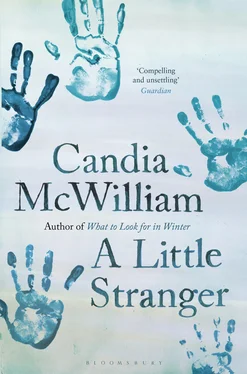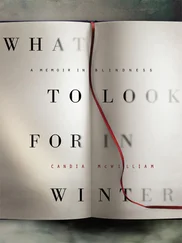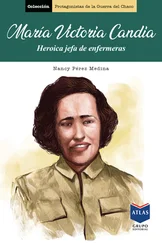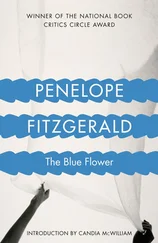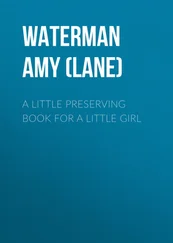Candia McWilliam - A Little Stranger
Здесь есть возможность читать онлайн «Candia McWilliam - A Little Stranger» весь текст электронной книги совершенно бесплатно (целиком полную версию без сокращений). В некоторых случаях можно слушать аудио, скачать через торрент в формате fb2 и присутствует краткое содержание. Год выпуска: 2011, Издательство: Bloomsbury UK, Жанр: Современная проза, на английском языке. Описание произведения, (предисловие) а так же отзывы посетителей доступны на портале библиотеки ЛибКат.
- Название:A Little Stranger
- Автор:
- Издательство:Bloomsbury UK
- Жанр:
- Год:2011
- ISBN:нет данных
- Рейтинг книги:3 / 5. Голосов: 1
-
Избранное:Добавить в избранное
- Отзывы:
-
Ваша оценка:
- 60
- 1
- 2
- 3
- 4
- 5
A Little Stranger: краткое содержание, описание и аннотация
Предлагаем к чтению аннотацию, описание, краткое содержание или предисловие (зависит от того, что написал сам автор книги «A Little Stranger»). Если вы не нашли необходимую информацию о книге — напишите в комментариях, мы постараемся отыскать её.
A Little Stranger — читать онлайн бесплатно полную книгу (весь текст) целиком
Ниже представлен текст книги, разбитый по страницам. Система сохранения места последней прочитанной страницы, позволяет с удобством читать онлайн бесплатно книгу «A Little Stranger», без необходимости каждый раз заново искать на чём Вы остановились. Поставьте закладку, и сможете в любой момент перейти на страницу, на которой закончили чтение.
Интервал:
Закладка:
We had a heavy yawl, with storm keels like a seal’s flippers, clumsy to handle and not very stable. Stepping its mast was enough work for two men, not a sedentary man and his child. We took buckets and darrows and caught eels inside the dykes, where the water was sweet. They hung like birdscarers in a pea field, metallic in the green water. We would trail them behind us until we had made fast to the dyke, by groaning hempen springs, so as not to tangle the lines. Later, we smoked the eels in a box my father made from the largest size of hopje tin. To skin an eel, imagine taking down the socks of a soaked child, swiftly and mercifully. To eat a smoked eel as the Dutch did in my childhood, lift your head and swallow like a cormorant.
Like those ugly birds (the shag is a limber diver), the Dutch have condign and discreet skills of elegance: skating, printing and the breeding of tulips. Dutch flowers and Dutch food and Dutch books were what I had made about me of Holland in this very English England. But John (or Jan) looked absolutely Dutch, even with his cropped linen hair. At first Rembrandt’s little Prince of Orange, he had now become a Little Dutch Boy.
My Dutch tulips were grown for cutting. One whole side of the walled garden was cleaned and mulched for them. They were lifted, sorted and stored in darkness according to their age and type, and planted again in the soft days of autumn. Mount and I had found at a sale a quartet of cabinets which had contained moths (wafers of buff and silver drifting out of drawers without the panic of living moths told us this, also pins headed with brown sealing wax). We kept the tulip bulbs in these cabinets. We had lined the drawers with black acid-free tissue paper, best for wedding dresses too, since it keeps out the cruel light. Mount liked the fussing over the tulips, but Basil preferred his vegetable kingdom.
The first year the tulips came up, Mount said, ‘I never liked proper tulips anyroad.’ These tulips were improper. They squared up no smart formations of cardinal red and Sunday School pink.
Some of the tulips were very tall; some were white and green as ice, with dark brown pollen smelling of Douwe Egberts coffee. Some, shorter, twisted a little to offer torn white frills of ragged, overdressed but formal skirt. We planted each type of tulip in a block, with a thin gully between each, like paint in the pans of a paintbox. Every one of the tulips being white or cream or unsalted-butter yellow, with a fringe or a dash or sport or streak or eye or ripple or stipple or freckle or mane or dusting of one other very clear colour, or combination of clear colour, so that colour was pricked with colour.
We cut them only when all five stamens were visible. I changed their water three times a day, discarding it when the oxygen had left. I kept the flowers until every petal had fallen. I did not pick up the dropped petals until they had turned through translucency to transparency, to lassitude. The streaks on the whitest of the tulips were the red of Bols redcurrant gin, bloodless singing red. After the petals’ fall, they turned very slowly through mauve to deep venous blue.
Chapter 23
‘Monday again,’ said John.
‘You could call it something else,’ I suggested.
His shoes were on the correct feet. He was getting old more swiftly than I was, just for a time. At some point we would be level, then he would be indulging me and teaching me to ride my wheelchair.
‘A rose by any other name,’ said Margaret. She looked quite mended. I said so.
‘Was she cracked?’ asked John. A wisecracker, like his grandfather.
Margaret began to bustle. She was in a hurry. Her make-up was done to a less high finish than usual.
‘Meeting the other nannies?’ I asked her.
She shook her head, lips pursed. I was packing a red plastic lunchbox. Red apple, chunk of Edam cut like a clog-toe, tub of yoghurt with cinnamon, two Speculaas biscuits in the shape of windmills. It was John’s first morning at his new school.
‘Eat the sails off the windmill one at a time and only if you have finished the other stuff,’ I told him. I had bought a chocolate ‘J’ to give him when he got back. Zwarte Piet leaves these chocolate letters in the clogs of good children on Sinterklaas, the feast of Saint Nicholas. Not Old Nick but Fat Nick.
Margaret was revving the car. She regarded her mouth in the driving mirror, lifting her chin as though settling a stock. I saw her nick the corners of her mouth with her index fingernail, and wipe that finger on something. It was as though she did it to widen her smile. She then rolled down her bottom lip, and I saw her scoop along inside it with the fourth finger of her right hand. She wiped that finger too.
She leant on the horn.
‘Bye, Mum,’ said John. ‘If you can’t be good, be careful.’
The car wrote the thousand thousand names of God on the gravel with its clenching tyres.
One more letter. Perhaps a reply to one of my fan letters. I liked to think of them as fan letters. It gave an eighteenth-century silhouette to my picture of myself and my correspondents. There I sat at my desk, enceinte but nimble-wristed, quilltip to well of ink, pelisse becomingly tied. I could imagine the recipient of my letters, a lady poised in the application of a mouche, the infant growing strong enough now to bestride his ribboned hobby horse, the gentleman quizzing histrionically, one hand flung beneath his coats and out, as though shaking off the dust of the street.
The letter ran:
Dear — it gave my name –
Your tapes are in. We regret to inform you that Human Kindness is out of stock. Stark Mad, Arcadia and Ecce Homo are in. Yours truly, M. Cabally.
Junk mail, by any name. But who could they have confused me with? Who could possibly be interested in pretending to be me? What had I to offer the disciple of Ecce Homo?
Edie and Bet came. There was no sign that Margaret had mentioned her worries to them. Had she really been trying to express something else? Very shy or very conventional people could use these codes. Was I too wrapped up in the baby? Was it too wrapped up in me? Women all together could affect each other like small moons. Did she feel somehow excluded from the coming excitement? Did she feel she was not part of our family? She was after all so young. Love was demanded from her, yet never too much. She had to mother, without being a wife. She could never receive the sum of love given to parents. How good she was — though not good enough to eat.
‘Just off,’ said Bet, stamping in to my morning-room. ‘I came to give you this, only I did not want Madam to see.’
There had been this sort of jealousy betäween Bet and a nanny before, because Bet so loved John she wanted him to do messy things with her, tarnishy brass-cleaning and wild hooplas with suds and sopping laundry.
‘All part of growing up,’ Bet said. ‘I don’t reckon much to growing up without a bit of mess. Got to eat a peck of dirt before you go.’
Bet had brought me a white knitted shawl, a soft wheel of web. She had made one before John’s birth, too. Made for the entanglement of those pink star-fish baby fingers, but warm and soft.
‘It’s really lovely. Thank you, Bet. You shouldn’t have. You said I’d have cause to thank you and this is it. Thanks so much.’
‘I’d rather far give you the big thing to thank me for but I dare not, God help me, for I don’t know myself what’s going on.’ There was a cold pause. ‘Well, you can’t stop being sweet on babies, can you?’ she said. Then, not enduring my forbearance, she said, ‘No, but really, don’t tell her .’ This last in a demon-king whisper.
I began the soft answer which turneth up wrath to a rolling boil.
‘Needs must when the devil drives. I’ve got to get back and feed the guineas,’ she said, seeping reluctantly into a normal voice.
Читать дальшеИнтервал:
Закладка:
Похожие книги на «A Little Stranger»
Представляем Вашему вниманию похожие книги на «A Little Stranger» списком для выбора. Мы отобрали схожую по названию и смыслу литературу в надежде предоставить читателям больше вариантов отыскать новые, интересные, ещё непрочитанные произведения.
Обсуждение, отзывы о книге «A Little Stranger» и просто собственные мнения читателей. Оставьте ваши комментарии, напишите, что Вы думаете о произведении, его смысле или главных героях. Укажите что конкретно понравилось, а что нет, и почему Вы так считаете.
